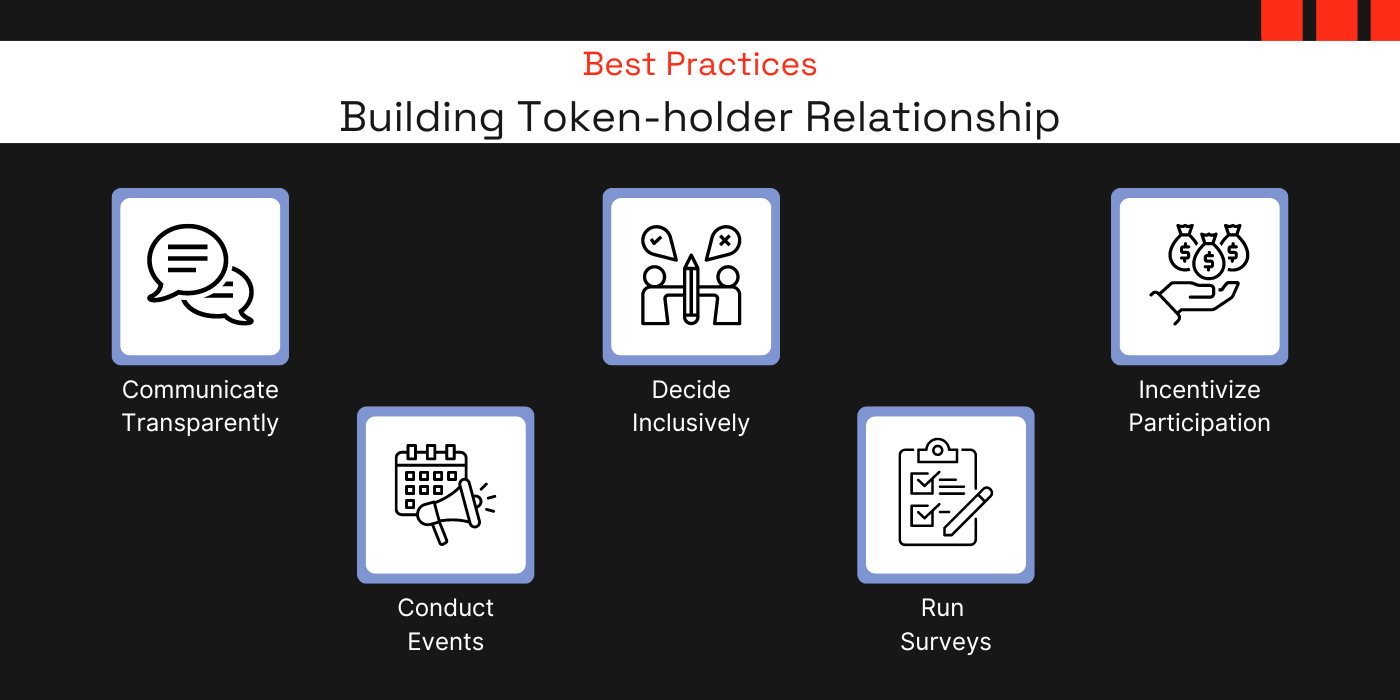Get insights.
Unlock value.
- 14-day free trial
- Set up in minutes
- No credit card required
Best Practices For Building Strong Token-Holder Relationships
Web3 industry is fast evolving. Community-based growth is the cornerstone of Web3 projects.
The holder of a Web3 project’s native token is generally called a Token-holder. The token-holder gets a financial stake in the project by purchasing or earning project tokens through sales or airdrop. It became a necessity to maintain a strong relationship with the token-holder for the success of the Web3 community.
Though Web3 projects face an upturn or downturn due to market cycles and their impact on token price fluctuations, token-holder relationships within the community help build resilience. Token-holder relationships help build long-term success by fostering active participation.
In this writing, I will discuss the challenges & best practices for cultivating healthy relationships between Token-holders & Web3 community managers. In addition, I will also discuss the role of BlockSurvey in community building & how it helped Yuga Labs.
Challenges in Building Token-holder Relationships
Building healthy Token-Holder relationships has its own challenges. I have discussed 3 widely felt challenges below.
-
Impossible Communication
Web3 is pseudo-anonymous, so knowing token-holders is a difficult task. Many times, you wouldn’t know who your actual holders are. This said an actual well-intentioned communication could be a miscommunication on community channels or on socials. So listening to the degens is quite impossible many times.
-
Fading Excitement
Token-holders are in high spirits during the initial developmental stages of the community. Their excitement fades over time, especially when there is a significant drop in the token price due to market fluctuations. The complexity of Web3 technology also contributes to the fading excitement among token-holders.
-
Compliance Burden
Rules and regulations are rapidly evolving in the Web3 industry. The need to comply with all regulations causes a cognitive burden among token holders. This burden overwhelms the token-holder, leading to less or no time spent on community relationships.
The Bitconnect project collapsed partly due to poor token-holder relationships. BitConnect’s poor token-holder relationship stemmed from lack of transparency, unrealistic promises, and the eventual collapse of its Ponzi scheme, which caused massive financial losses and eroded trust.
Best Practices for Building Token-Holder Relationships
Best practices help overcome challenges faced in building Token-Holder relationships in the Web3 community. Here, I will discuss the 5 best practices for building successful Token-holder relationships.

-
Communicate Transparently
Trustworthy communication is a crucial element in the decentralized world. Regularly communicate with the Token-Holders, notifying them of announcements, new features & other Token-related updates. Use multiple communication channels like email, social media & project website. The Token-holders feel connected with this type of communication.
-
Decide Inclusively
Do you give a stake to token-holders during decision-making? Do they have their say in the community? Introduce easy-to-use voting mechanisms for democratic governance. Make sure token-holders can vote on Governance proposals. Give your token-holders access to engage in community discussions, abiding by the ethos of decentralized systems.
-
Incentivize Participation
Show a sense of value & appreciation by incentivizing participants. The incentive can be in any form. It can be a staking reward for validating a transaction in the BlockChain. It can be a Fungible Token or Non-Fungible Token transferred during Airdrop. It can also be an access to the new feature in your decentralized application. With this approach, Token-holders feel valued.
-
Conduct Events
Token-holders will be interested in taking part in community events. Conduct AMA (Ask Me Anything) sessions to address Token-holder’s questions. Make sure to celebrate important project milestones with Token-holders in open forums. Your Token-holders eventually will become passionate advocates of your project.
-
Run Surveys
Surveys are known to provide control & consistency while receiving responses. Create surveys and feedback forms for maintaining a feedback loop with Token-holders. Make sure to act on the feedback. This will help you understand the sentiment of Token-holder and pave a way for improved relationships.
The Chainlink project followed best practices to build strong token-holder relationships in the community. Chainlink strengthened its token-holder relationship through transparent communication, consistent project updates, community involvement in governance, and clear utility for its token in the network.
How can BlockSurvey help you build a token-holder relationship?
BlockSurvey helps you build stronger Token-Holder relationships. Let’s see how.
- Secure Surveys & Forms are end-to-end encrypted. With this zero-knowledge platform, you hold complete ownership of your data. This helps receive honest feedback from token-holders to address community concerns.
- Anonymous Voting is enabled by BlockSurvey’s ‘Anonymous seal’ feature, which can help with Anonymous voting on community governance proposals. The anonymity of token-holders during voting reduces the fear factor, thus promoting free community governance.
- Are you receiving many survey responses, but are worried about the quality of the responses? BlockSurvey’s Token-Gating feature can help you. With this feature, only qualified respondents who hold a particular token are allowed to take the survey. This increases response quality, as well as relationship quality.
How Yuga Labs Strengthened Token Holder Relationship?
Jeff Nicholas is the creative director at Yuga Labs. He faced challenges while collecting meaningful data from their Token-holders.
BlockSurvey’s Token-gating feature ensured that only Token-holders could take the survey. It stopped Jeff from collecting spam responses from bots & unqualified respondents. This also enabled token-holders to participate more confidently in the survey, knowing their data is safe on the secure BlockSurvey platform.
The outcome of Token-gating was remarkable. It strengthened token-holder's relationship with Yuga Labs. Jeff Nicholas finally became a happy customer of BlockSurvey.
Conclusion
Token-holder relationship stands as a key differentiator to ensure the success of Web3 projects.
Amidst challenges, the best practices discussed in this writing build strong Token-Holder relationships & enhance overall project health.
BlockSurvey’s ‘Anonymous Seal’ & ‘Token-Gated’ feature helps in building long-term Token-holder relationships.
Start strengthening your Token-Holder relationship with BlockSurvey today!
Best Practices For Building Strong Token-Holder Relationships FAQ
What are some common mistakes when managing Token-Holder relationships?
Common mistakes include inconsistent communication, setting unrealistic expectations, and failing to provide clear engagement opportunities, leading to disconnection and mistrust among token-holders.
How can I measure the success of Token-Holder relationship management strategies?
Success can be measured by engagement rates, participation in governance, feedback from surveys, and overall sentiment analysis in community discussions.
What role do third-party platforms play in enhancing Token-Holder relationships?
Third-party platforms provide tools for secure communication, governance facilitation, and analytics, helping projects manage engagement, compliance, and feedback effectively.
What are the potential risks of involving Token-Holders in governance decisions?
Risks include decision paralysis and power centralization; these can be mitigated with weighted voting, clear governance frameworks, and education to ensure informed participation.
Get insights.
Unlock value.
- 14-day free trial
- Set up in minutes
- No credit card required


